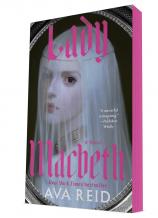Lady Macbeth
Review
Lady Macbeth
Ava Reid, the New York Times bestselling author of JUNIPER & THORN and THE WOLF AND THE WOODSMAN, returns with LADY MACBETH. This stunning, gorgeously rendered work of gothic fantasy goes beyond William Shakespeare’s famous tragedy to closely examine the Bard’s most iconic villainess.
The daughter of a composed but cruel duke, 17-year-old Lady Roscille has always been followed by whispers of witchcraft. Though her father balks at fanciful superstitions, theirs is a kingdom riven by distrust and greed, and he knows better than to ignore his citizens’ fear of his daughter…and her supernatural, witch-kissed beauty. A cascade of shimmering, pale hair falls down her back, her skin appears bloodless, and it is said that one look into her eyes will drive a mortal man to madness. The Duke doesn’t know if she is a portent, an omen or just a girl, but he is certain of this: a thing feared by men easily can be turned into a weapon.
"...[a] stunning, gorgeously rendered work of gothic fantasy... [T]his spellbinding reincarnation of the Bard’s work excels for its bravery, uniqueness and mist-shrouded, bottomless magic."
When we meet Roscille, she has crossed the forests of Breizh --- void of the vicious Northmen her father recently beat back from the channel --- and the shores of Bretaigne, a rocky wasteland. She is just arriving at Glammis, the land of her husband: Macbeth, the Thane of Glammis. Roscille knows only that Macbeth is a mountain of a man, and his lands --- those of the Scots --- adhere to an older, richer faith. It is full of superstitions and mythologies, all of which are upheld by primitive sacrifices and blood-curdling violence. Roscille, whose recent disagreement with her father sealed her fate, is aware that the cruelty of men knows no bounds, and she will have to be more than a quiet, doting wife. To survive Glammis, she will need to be cunning, a warrior of the mind if not the sword.
Macbeth, however, is not the husband Roscille expects. True, he is huge (disgustingly so), as well as brusque and brash. But he also is more clever than she imagined, and a bit more devious. While the king, Duncan, has outlawed witchcraft and sorcery and vowed to banish it from the kingdom, Macbeth not only has taken a witch-presumed wife; he reveals to Roscille that he has taken three witches captive in his castle’s basement. Here, they wade in stagnant waters, clutching their faces while delivering shrill, screaming prophecies, and telling Macbeth that he is destined for greatness. He will be King Hereafter, which makes Lady Macbeth his queen.
With Macbeth hell-bent on vengeance and power, and Roscille desperate to avoid the consummation of her marriage, she assigns him four tasks to earn her honor. Each one has an ulterior motive. Some, like a ruby-red charm, will further endear Roscille to her husband as a shallow, mindless girl. Others result in blood spilled and villages felled, yet they also provide her with opportunities to observe her husband as a man and leader. But Macbeth is wise too, and when he discovers that there’s more to the rumors about his wife’s powers than her fearless father would have him believe, he starts plotting for more. He orders his wife to be the dagger in his hand, an unassuming, pretty package of mayhem who can compel and ensorcel men to do her bidding.
However, with the destruction of villages and the felling of other Thanes comes competition. True to the novel’s source material, a succession crisis follows the death of the king, and even members of Macbeth’s own court are accused of treachery and betrayal. But this story is all the Lady’s, and her magic is enough to end them all.
If there is someone who reads as though they were born to write gothic fantasy and suspense, it’s Ava Reid. She creates an exquisite, multifaceted heroine in Roscille, a woman previously thought of only as ambitious and insane, but is now rendered in bright, reclaiming light. In her reflection of the original tragedy and her depiction of Scotland, Reid’s research, handling of her knowledge and rendering of her details is sheer perfection. She has a powerful ability to blend fact and fiction, and the combination is literary and accessible. Eternal and immediate, the richness of the novel’s mythology grows and blooms from the wrinkles of its contradictions, which do not obfuscate its themes. Rather, they give them more meaning and greater depth.
Reid’s mind is rich and boundless. While she has made the tragedy all her own --- or, should I say, Lady Macbeth’s --- she occasionally strays too far from her starting point, prompting the question of whether or not this should have been an original novel rather than a retelling. That said, this spellbinding reincarnation of the Bard’s work excels for its bravery, uniqueness and mist-shrouded, bottomless magic.
Reviewed by Rebecca Munro on August 17, 2024
Lady Macbeth
- Publication Date: May 6, 2025
- Genres: Fantasy, Fiction, Gothic, Historical Fantasy, Historical Fiction
- Paperback: 320 pages
- Publisher: Del Rey
- ISBN-10: 0593722582
- ISBN-13: 9780593722589




